

La pregunta correcta para generar Abundancia en tu vida - Pensamiento positivo. Si deseas manifestar Abundancia en tu vida, es preciso que comprendas que en último término en el mundo sólo hay dos energías y en cada circunstancia o momento, lo sepas o no, vives acompañado por una de ellas.
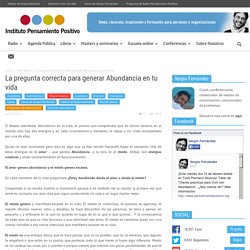
Quizá no seas consciente pero esto es algo que ya has venido haciendo hasta el momento. Una de estas energías es el amor – que genera Abundancia- y la otra es el miedo. Ambas son energías creativas y están constantemente en funcionamiento. El amor genera abundancia y el miedo genera escasez. En cada momento de tu vida pregúntate ¿Estoy decidiendo desde el amor o desde el miedo? Comprendo si te resulta insólito o inverosímil porque a mí también me lo resultó la primera vez que entré en contacto con esta idea que sigue conduciendo mi vida a un lugar mucho mejor. Cómo enseñar a un adolescente a tener fuerza de voluntad. Los jóvenes a menudo confunden la fuerza de la decisión con el simple deseo o apetencia de algo Proponer mucho y hacer poco.
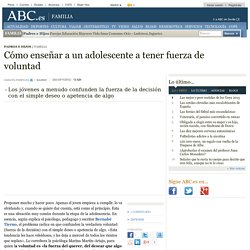
Apenas el joven empieza a cumplir, lo va olvidando y, cuando se quiere dar cuenta, está como al principio. Esta es una situación muy común durante la etapa de la adolescencia. En esencia, según explica el psicólogo, pedagogo y escritor Bernabé Tierno, el problema radica en que confunden la verdadera voluntad (fuerza de la decisión) con el simple deseo o apetencia de algo. «Esta tendencia les hace veleidosos, y les deja a merced de todos los vientos que soplan». La realidad es que para los adolescentes, prosigue la psicóloga y psicoterapueta Rosario Linares, de El Prado Psicólogos, «es especialmente difícil renunciar a las satisfaciones inmediatas, y a que tienden a hacer "lo que les apetece" sin tener presentes las consecuencias a largo plazo. Este es el camino estos especialistas para educar la voluntad: —Siendo un ejemplo para ellos. Early Intervention Foundation.
This review bolsters the evidence on the strong links between social and emotional skills in children and how they fare as adults.
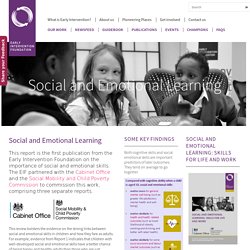
For example, evidence from Report 1 indicates that children with well-developed social and emotional skills have a better chance of being happy and healthy adults than those who are just academically-able. New analysis in the report of data from the 1970 Cohort Study finds that social and emotional and cognitive skills are each very important for future life. Their development is related. Children with strong cognitive skills typically show stronger social and emotional development, and vice-versa. However, social and emotional measures provide important signals about likely outcomes above and beyond what is picked up by measures of literacy and numeracy.
The EIF is today setting out key recommendations to ensure social and emotional skills are given the priority they need. Carey Oppenheim, EIF Chief Executive, said:
Habits: How They Form And How To Break Them. Routines are made up of a three-part "habit loop": a cue, a behavior and a reward.
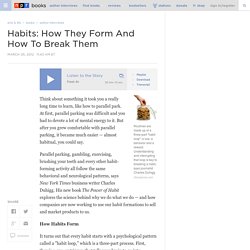
Understanding and interrupting that loop is key to breaking a habit, says journalist Charles Duhigg. iStockphoto.com hide caption itoggle caption iStockphoto.com Think about something it took you a really long time to learn, like how to parallel park. At first, parallel parking was difficult and you had to devote a lot of mental energy to it. Parallel parking, gambling, exercising, brushing your teeth and every other habit-forming activity all follow the same behavioral and neurological patterns, says New York Times business writer Charles Duhigg. The Four Habits that Form Habits. By Leo Babauta My daughter wants to work out more, but she has a hard time forming the habit (many of you might be familiar with this problem).
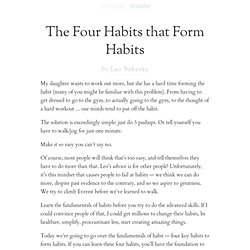
From having to get dressed to go to the gym, to actually going to the gym, to the thought of a hard workout … our minds tend to put off the habit. The solution is exceedingly simple: just do 3 pushups. Or tell yourself you have to walk/jog for just one minute. Make it so easy you can’t say no. Of course, most people will think that’s too easy, and tell themselves they have to do more than that. Learn the fundamentals of habits before you try to do the advanced skills.
Today we’re going to go over the fundamentals of habit — four key habits to form habits. Habit 1: Start Exceedingly Small Another common habit that too few people actually do is flossing daily. Of course, that seems so ridiculous most people laugh. That’s the point. How To Find And Follow Your Passion. The words cut through me like an iron-hot knife through butter.
When you see a young person desolate, empty and defeated, it is not a pretty sight. The ball of energy, innocence and ultimately faith, diminished. Empty. Passion picture from Shutterstock “Well, do you really think you want to become a nurse?” She nodded slowly, avoiding looking at me, in shame. “Do you know how often you’ll come across a ‘nine’ in your life?” “Is that it? Just because you are finding things difficult, you shouldn’t give up. “How much do you want it?”